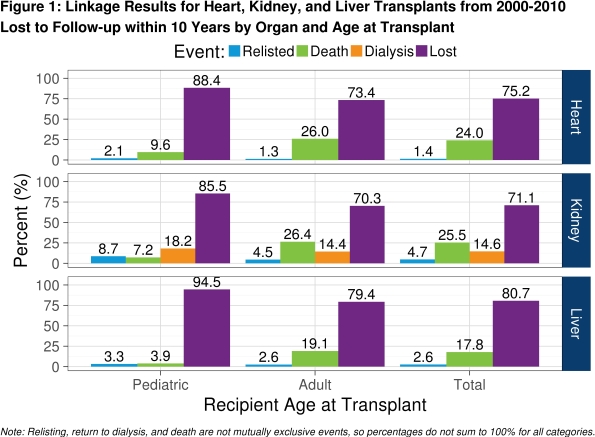Differences in Pediatric and Adult Lost to Follow-Up Events for Heart, Kidney, and Liver Recipients
1United Network for Organ Sharing, Richmond, VA
2Children's Hospital of Pittsburgh, Pittsburgh, PA
3University of Wisconsin Hospital and Clinics, Madison, WI
4Children's Healthcare of Atlanta, Atlanta, GA.
Meeting: 2018 American Transplant Congress
Abstract number: B228
Session Information
Session Name: Poster Session B: Kidney: Pediatrics
Session Type: Poster Session
Date: Sunday, June 3, 2018
Session Time: 6:00pm-7:00pm
 Presentation Time: 6:00pm-7:00pm
Presentation Time: 6:00pm-7:00pm
Location: Hall 4EF
Background: Long-term follow-up data are necessary for accurate survival estimation. While the majority of heart (HR), kidney (KI), and liver (LI) transplant recipients (TxR) are followed by their program, many end up reported to the OPTN as lost to follow-up (LTFU). Some patients who die or return to the waiting list can be identified, but those living with functioning grafts cannot. This is of particular concern for pediatric (PED) TxR, as they have potentially decades of graft function ahead of them after receiving a transplant.
Methods: We queried the OPTN database for all HR, KI, and LI TxR between 2000 to 2010 who were LTFU within 10 years of transplant. TxR who returned to the waiting list as of March 2017 were identified, and deceased TxR were identified using verified external sources including the Social Security Master Death File. KI TxR who returned to dialysis were identified using CMS Medical Evidence Form 2728. Linkage results were compared by age group at transplant.
Results: We identified 1,212 HR, 24,636 KI, and 5,437 LI TxR LTFU within 10 years of transplant. The majority of TxR LTFU remained lost regardless of organ or age at transplant (Figure 1). PED TxR accounted for 12% of HR, 5% of KI, and 8% of LI TxR LTFU. A larger proportion of PED TxR remained lost across all organs (HR: 88% PED vs 73% adults, p=0.0001; KI: 85% vs 70%, p<0.0001; LI: 95% vs 79%, p<0.0001). PED KI TxR were more likely to be relisted (9% PED vs 5% adults, p<0.0001) or to return to dialysis (18% PED vs. 14% adults, p=0.0003) compared to adults.
Conclusion: PED TxR were more likely to remain lost, be relisted, or return to dialysis than adults. Without data from lost PED TxR, long-term PED patient and graft survival may be underestimated. Improved long-term follow-up is essential to better understand long-term PED TxR outcomes.
CITATION INFORMATION: Robinson A., Mazariegos G., Bartosh S., Mahle W. Differences in Pediatric and Adult Lost to Follow-Up Events for Heart, Kidney, and Liver Recipients Am J Transplant. 2017;17 (suppl 3).
To cite this abstract in AMA style:
Robinson A, Mazariegos G, Bartosh S, Mahle W. Differences in Pediatric and Adult Lost to Follow-Up Events for Heart, Kidney, and Liver Recipients [abstract]. https://atcmeetingabstracts.com/abstract/differences-in-pediatric-and-adult-lost-to-follow-up-events-for-heart-kidney-and-liver-recipients/. Accessed February 26, 2026.« Back to 2018 American Transplant Congress

